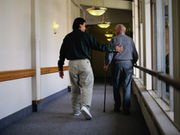Slow walking and weak handgrip linked to increased risk of Alzheimer’s disease
MONDAY, Aug. 15, 2016 (HealthDay News) — Physical function is associated with clinical and subclinical brain disease, according to a study published online Aug. 8 in the Journal of Alzheimer’s Disease.
Erica C. Camargo, M.D., Ph.D., from Boston University, and colleagues examined the correlation of fast-paced walking speed and handgrip strength with the risk of dementia, Alzheimer’s disease (AD), and stroke in a middle-aged community sample. A total of 2,176 participants from the Framingham Offspring study had physical function, brain magnetic resonance imaging, and cognitive evaluations from 1999 to 2005; they were followed until 11 years later for incident dementia, AD, and stroke.
The researchers found that slow walking and weak handgrip correlated with more than a 2.5-fold increase in the risk for AD. In persons aged 65 years and older, weaker handgrip was also associated with increased risk of incident stroke (hazard ratio, 1.74). There were correlations seen for both measures with lower total brain volume and poorer performance on visual memory, language, executive function, and visuoperceptual function tests. There were also correlations noted for slower gait with poorer verbal memory, and for weaker handgrip with poorer abstraction.
“Tests of walking speed and handgrip strength may serve as clinical markers of brain structure and function and may improve dementia risk prediction,” the authors write.
Full Text (subscription or payment may be required)
Copyright © 2016 HealthDay. All rights reserved.








